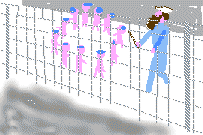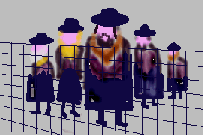|
updated: September, 01 2005 14:36 |
|
|
Menu introduction |
Previous page |
Back to helpfile |
Next page |

|
By the time, that we arrived at Westerbork, it must have been late, for
I recall only a huge barrack in the dark. (Everything was huge for a
four-year-old.) The camp was erected before the war, to house the German refugees, who fled the Nazis. As German nationals and perhaps as Jews, too, they were not treated kindly. When the camp was fenced in and guards mounted the miradors, they became the "Alt Eingesessene" (first settlers), who ran the camp. They decided, who should join a transport and who should stay. By then, everyone, except the biggest fools, knew what happened to these transports and what the name Auschwitz meant. So we were terrified of these revengeful German Jews! As a matter of fact, the Germans sent an expert, to find out, what made this camp such a success, sending without problems, the required sheep for slaughter. Between July 1942 and March 1944, 57,800 people were sent from Westerbork to Auschwitz, an average of 3,600 per month. During October 1942 alone 11,965 were sent to their deaths. During the months March till July 1943 the transports, which were directed to Sobibor, contained 34,313 people, nearly 7,000 per month. To Bergen-Belsen went only 3,724 people from January till September 1944. From April 1943 till September 1944 an add- itional 4,771 people were sent to Terezin. The total amounts to 100,608 victims, nearly the entire Dutch Jewry. There was a special barrack, separated by barbed wire from us, that housed the "S"-prisoners. "S" stands for Strafe (punishment). They were mostly young boys, suspected of underground activities. Every morning, they marched singing to forced labor. I think, that most of them went to Mauthausen, although I did not find a record of transports there. Hardly anyone of them survived. We met there some of our relatives, but soon they were also gone, like the others, who must have been murdered already before we were caught. We were there for eight months, until january 1944. One thing stands out in my memory. We had acquired additional inhabitants on our heads and had to be shaved and kept in quarantaine for a week. Also, since we arrived about two months before my fifth birthday, I was kept in the dark and thought, that I was only four until my sixth birth- day. My parents could certainly not cater for a birthday-party. Once a week, we would get Brussels sprouts for lunch. The kitchen-staff was not very interested in the quality, so it was dumped into the pot, with all that it contained, earth and worms, too. Binyomin and I, did not like it and would not finish our plates. So we were kept at it, until our plates were empty. Since I was just five years old, it could take till four o'clock. But Binyomin was nearly seven and more resourceful. When nobody was looking, he took a sprout in his hand and rolled it under the bed. From there it continued under the next and was well out of sight and after several throws, his plate was empty. Heaven ly Help prepared in advance The war was not going as easily as the Nazis had hoped, Therefor they considered keeping the British subjects, even Jews for bartering. Hereto they built an Aufenthalts-Lager at Bergen-Belsen. Since Rivqa was born in "British Mandate" Palestine, she had somewhat a status of "British subject" and could “apply” for the protection of the British Empire. Therefor we were considered more eligible for B.-B., than for Auschwitz. I point out, that from over 100,000 Dutch Jews, only 3,724 (less than 4%) were sent to Bergen-Belsen. We arrived there on January, 11th 1944.I point out, that to Bergen-Belsen went only 3,724 from over 100,000 Dutch Jews, which amounts to 3.7 %. In order to save us from destruction, Hashem created this combination, of Rivqa being "British Subject" and the fact, that we were not caught until May 1943. This saved us from going to Auschwitz. Had we arrived in Westerbork earlier or had we not had any special claim to be eligible to be sent to an Aufenthaltslager, we would have gone with the rest of the family to Auschwitz. | ||||||
- 2 - | ||||||
Bergen is 17 miles N.N.W of Celle, which is 25 miles N.E. of Hannover.
Celle was the nearest train-connection and served the camp. We arrived
there in the middle of the winter, but I can't remember, that the
weather was forbidding. In that part of
Later on, other barracks were built in this area and the Appell-platz moved further down. Or maybe I don't remember right and it was the other way round. After we were in Bergen-Belsen for six months, in rather acceptable condition, my mother told me, that my birthday was coming. "Oh, great!" I exclaimed, "now I'll be five!" "No", she said, "You'll be six now!" "No, now I'm four and next week I'll be five!" Then she explained to me, that the previous year, they had skipped my birthday. I was very disappointed, that they could play such a trick on me. When she asked me, what present she could give me, I requested a pancake, all for myself. When I woke up on the great day and opened my eyes, she was at my bedside with the pancake ready. She had also made one for the others and I suppose, that I shared part of mine also. But it shows, that food was very much on my mind and that there were still small luxuries, like flour and margerine and a bit of sugar. Some time later, we moved to barrack "23", which housed also French Jews. Soon after, we moved to the "26", which was located close to the "18", but further from the gate. The first barracks had been built from new boards, but the new barracks were made from used materials from demolished barracks, brought in from other camps. Also a barbed-wire fence was added, which passed from the gate close to our barrack. Thus the "11" barrack was cut off from our part. In the space on the other side of the fence, we
The worst part came in the "hunger-winter" 1944-1945. Not only the Germans were having a rough time themselves, losing battle after battle and having no provisions left, after five years of war. But the winter was very harsh and claimed many victims, from cold and starvation, even outside the camps. Meanwhile Auschwitz was evacuated and many Jews, mainly Hungarian women, were transferred to our camp. The Satmar Rebbe zts"l Also the saintly Rabbi of Satmar, Rabbi Yoel Teitelbaum, zts"l, was for some time in Bergen-Belsen, but not in our part. My father was working outside our partition, together with another frum Jid from The Hague, Mr. Van Leeuwen, z"l, when he noticed across the barbed-wire fence, a sight out of this world!
A German's kindness Once, on a cold night, with a layer of snow blanketing the earth, Rivqa was sent out on an errand. There was a curfew and we were not allowed out so late. (Sorry, I checked out and it was early on a cold morning!) And maybe that was precisely, why she was sent, as she was only nine years old. There was a gate, guarded by a soldier, in the fence, that was erected to cut off the camp from the old Appell-Platz. The SS were too cowardly to be found alone at night in the camp and it was below their status. When she passed in the vicinity, the guard called out to her. She felt, that her last hour had sounded. With leaden shoes she approached him. He opened his greatcoat and his tunic and reached inside. His hand came out with a small parcel, which he thrust into her hands. She ran off as fast as she could. When mother opened it, she found there six slices of army bread. Not the sawdust, that was distributed to us, but real brown bread! Glossary
|

|
(to be continued) Look for the next installment! |
| © 1998, 1999, 2001 GeoCities. All rights reserved | |||||||


